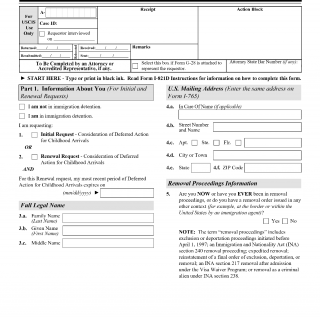Form I-821D. Consideration of Deferred Action for Childhood Arrivals
Form I-821D, Consideration of Deferred Action for Childhood Arrivals, is a form used by individuals who came to the United States as children and meet certain criteria to request deferred action from deportation for a period of two years, subject to renewal.
The main purpose of the form is to allow eligible individuals to request temporary protection from deportation and apply for employment authorization. The form consists of several parts, including personal information, education and employment history, criminal history, and eligibility criteria.
Important fields on the form include the applicant's name, date of birth, country of birth, immigration status, and information about any criminal convictions. The parties involved in the process are the applicant, the US Citizenship and Immigration Services (USCIS), and potentially other government agencies, such as the Department of Homeland Security (DHS).
When writing the form, it is important to consider providing accurate and complete information, as any false statements or omissions may result in denial of the application or revocation of deferred action. Supporting documentation, such as evidence of identity, residence, education, and employment, may also need to be attached to the form.
Application examples and use cases for the form include individuals who were brought to the US as children and have lived in the country for a certain period of time, have no significant criminal history, and meet other eligibility criteria as outlined by USCIS. The form provides an opportunity for these individuals to temporarily avoid deportation and work legally in the US.
Strengths of the form include providing temporary protection from deportation and the ability to apply for work authorization, while weaknesses include the temporary nature of the protection and the potential for changes in policy or enforcement priorities. Opportunities for individuals who receive deferred action include the ability to work legally and potentially obtain a driver's license or other benefits, while threats may include the risk of deportation if the status is not renewed or if policies change.
Alternative forms or analogues include other forms for individuals seeking protection from deportation or work authorization, such as asylum applications or employment-based visas. The main difference between Form I-821D and other forms is the specific eligibility criteria and requirements for Deferred Action for Childhood Arrivals (DACA) recipients.
The form can affect the future of the participants by providing temporary protection from deportation and work authorization, potentially allowing individuals to pursue education or career opportunities. However, it is important to note that deferred action is not a permanent solution and does not provide a path to citizenship.
The form can be submitted to USCIS by mail or online, and USCIS will notify the applicant of the decision. The form and any supporting documentation will be stored in the applicant's USCIS file.

